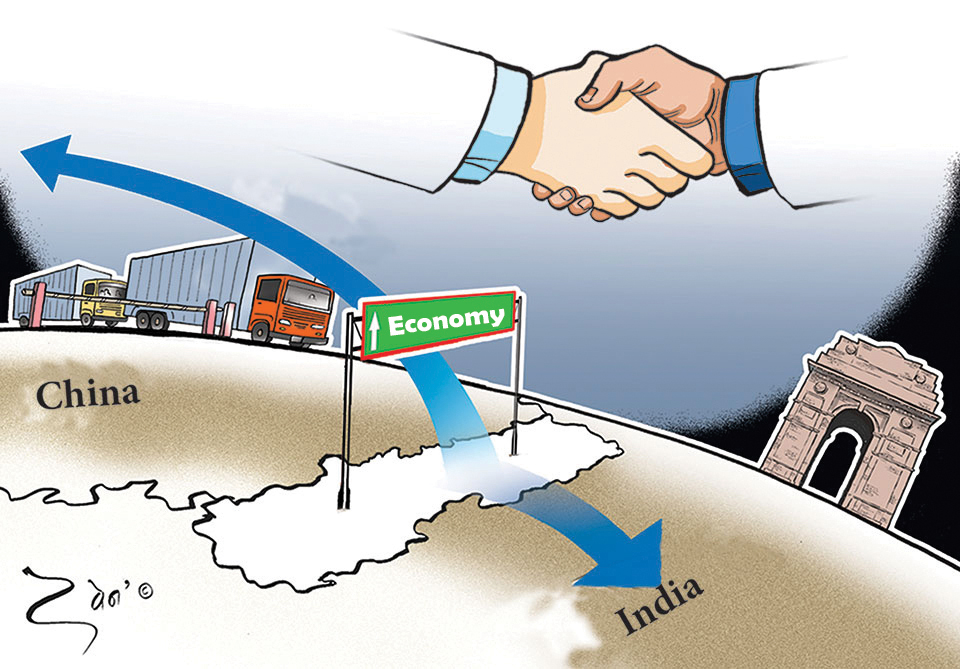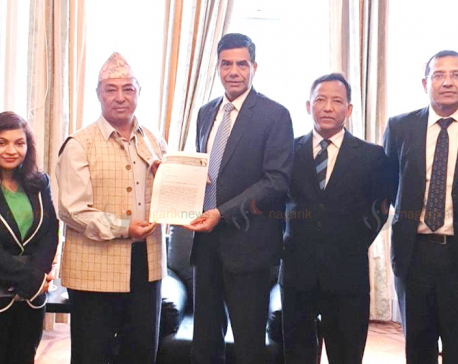
OR
#Editorial
Nepal's Trade Deficit Decline: Still a Long Way to Go
Published On: July 26, 2023 07:30 AM NPT By: Republica | @RepublicaNepal

In a welcome development for Nepal's economy, the trade deficit has declined by 15.45 percent, reaching Rs 1.454 trillion in the fiscal year 2022/23. This significant drop is largely attributed to the government's measures to check imports, responding to concerns over depleting foreign currency reserves and a fall in people's income due to the recession. While this reduction in the trade deficit is undoubtedly a positive step, it is essential to recognize that there is still a long way to go before achieving a sustainable balance in trade. To accomplish this, the government must focus on boosting domestic production and substituting imports with locally manufactured goods. The decline in Nepal's trade deficit is primarily a result of a notable fall in the country's import expenses. The ban on luxury items, enforced for almost six months during the last fiscal year, played a crucial role in curbing imports.
While these measures may have temporarily narrowed the trade deficit, it is vital to recognize that the rapid increase in imports after the restrictions were lifted also poses challenges. The removal of the provision of up to cent percent cash margin required for importers against their letters of credit further stimulated imports after the import restrictions were lifted. As a consequence, the country's import expenses saw a substantial increase in the latter months toward the end of the fiscal year. The sudden surge in imports can put additional pressure on the country's foreign currency reserves and harm domestic industries. Therefore, the government must develop a well-calibrated and sustainable strategy to regulate imports, ensuring they do not outpace the growth of domestic production and exports. Another concerning aspect is the sharp decline in Nepal's export earnings, which fell by 21.44 percent during the same period. With Nepal earning a mere Rs 157.14 billion from exports last year, it is evident that the country heavily relies on imports while struggling to capitalize on its export potential. This lack of export diversification leaves Nepal vulnerable to external shocks and fluctuations in global markets. To address these challenges and achieve a more balanced trade situation, the government needs to prioritize several key measures.
One of the major imports of Nepal that has contributed to ballooning trade deficit each year is the import of petroleum products. Nepal spent Rs 300.31 billion to import petroleum products in the last Fiscal Year. Nepal can significantly reduce the trade deficit if the government takes necessary measures to promote electric vehicles in the country. Another measure that the government can pursue is to focus on boosting domestic production across various sectors. By investing in infrastructure, technology, and skill development, the government can enhance the competitiveness of local industries and promote self-reliance. This, in turn, will lead to a reduction in the reliance on imported goods and stimulate exports. Thirdly, promoting import substitution is crucial. Instead of depending on foreign products, the government should incentivize the manufacturing of goods domestically, encouraging consumers and businesses to choose locally produced items over imports. This not only strengthens the domestic economy but also reduces the trade deficit. Additionally, Nepal needs to take measures to diversify its export base to further reduce the trade deficit. Currently, the country is heavily reliant on a few items for its exports, making it susceptible to fluctuations in global demand and prices. By identifying and nurturing new export sectors, the government can minimize risk and create a more resilient economy.
While these measures are critical to reduce the trade deficit, simplifying trade procedures and reducing bureaucratic barriers to encourage businesses to participate in international trade more actively are equally important in this regard. Streamlining customs processes and reducing unnecessary regulations can make Nepal a more attractive destination for foreign investors and exporters. Moreover, investing in research and development to enhance the quality and competitiveness of Nepalese products will be pivotal in increasing export earnings. This will require collaboration between the government, private sector, and academia to foster innovation and create products that meet international standards and consumer demands. The decline in Nepal's trade deficit is undoubtedly a positive development and a testament to the government's efforts to regulate imports. However, it is essential to view this progress as a stepping stone towards a more sustainable and balanced trade situation. To achieve this, the government must focus on boosting domestic production, promoting import substitution, diversifying exports, and creating a conducive environment for businesses to thrive. By taking these necessary measures, Nepal can reduce its widening trade deficit and build a strong and resilient economy for the future.
You May Like This

Nepal loses millions of foreign currency as pension of British Gurkha soldiers is remitted to Indian central bank
LONDON, April 30: The Gurkhas have objected to the loss of millions of rupees to Nepal as the pensions of... Read More...

Nepal online trade: Decorating Nepal
Nepal Online Trade is a business initiative of Sajak Yonjan that sells décor materials imported from China, Hong Kong, and... Read More...

58,348 foreign tourists arrived in Nepal in April
KATHMANDU, May 2: The arrival rate of foreign tourists in Nepal has increased by 159.9 percent in April 2022 as... Read More...






Just In
- Challenges Confronting the New Coalition
- NRB introduces cautiously flexible measures to address ongoing slowdown in various economic sectors
- Forced Covid-19 cremations: is it too late for redemption?
- NRB to provide collateral-free loans to foreign employment seekers
- NEB to publish Grade 12 results next week
- Body handover begins; Relatives remain dissatisfied with insurance, compensation amount
- NC defers its plan to join Koshi govt
- NRB to review microfinance loan interest rate











Leave A Comment